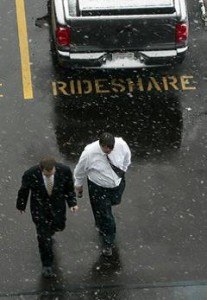 USAA will test auto insurance coverage in Colorado designed to fill a gap left in the surging ridesharing industry.
USAA will test auto insurance coverage in Colorado designed to fill a gap left in the surging ridesharing industry.
Ridesharing competes with traditional taxis by offering one-time shared rides over a short distance. The customer orders the driver service with little notice. Companies have run afoul of some state and local governments, in part for allegedly circumventing licensing laws and insurance coverage. At the same time, insurers have been slow to develop ridesharing policies.
USAA said that its pilot program, set to begin in February, will protect ridesharing drivers over the period that they turn on their ridesharing apps until they are matched with a passenger. The cost for coverage will be between $6 and $8 per month, or $40 to $50 for a six-month insurance policy, the insurance giant said.
Why start the pilot in Colorado? That’s, in part, because of legislation the state passed in June 2014 authorizing ridesharing services, but also mandating coverage during the period USAA addresses with its pilot project. Colorado is the first state to pass this kind of legislation, which kicks in on Jan. 15. USAA said Colorado is also a good place for its pilot coverage because the state has a large member and employee presence.
“Ridesharing is a growing industry, and it’s important that our members have the right insurance coverage,” Alan Krapf, president of the USAA Property and Casualty Insurance Group, said in prepared remarks. “This is also a critical time for USAA to test how best to provide this innovative coverage since many veterans are being recruited to drive for transportation network companies.
Since Colorado’s action, California Gov. Jerry Brown signed a new law in September requiring ridesharing companies (such as Lyft, Sidecar and UberX) to cover drivers from the time they turn on their ridesharing app.
In New York, officials have been more wary of ridesharing companies. In July, they obtained a temporary restraining order against Lyft before it planned to enter the New York City market. State officials alleged it operated in Buffalo and Rochester earlier in 2014 in violation of state and local licensing and insurance laws.
Source: USAA





















 Berkshire-owned Utility Urges Oregon Appeals Court to Limit Wildfire Damages
Berkshire-owned Utility Urges Oregon Appeals Court to Limit Wildfire Damages  Modern Underwriting Technology: Decisive Steps to Successful Implementation
Modern Underwriting Technology: Decisive Steps to Successful Implementation  Execs, Risk Experts on Edge: Geopolitical Risks Top ‘Turbulent’ Outlook
Execs, Risk Experts on Edge: Geopolitical Risks Top ‘Turbulent’ Outlook  Lessons From 25 Years Leading Accident & Health at Crum & Forster
Lessons From 25 Years Leading Accident & Health at Crum & Forster 









